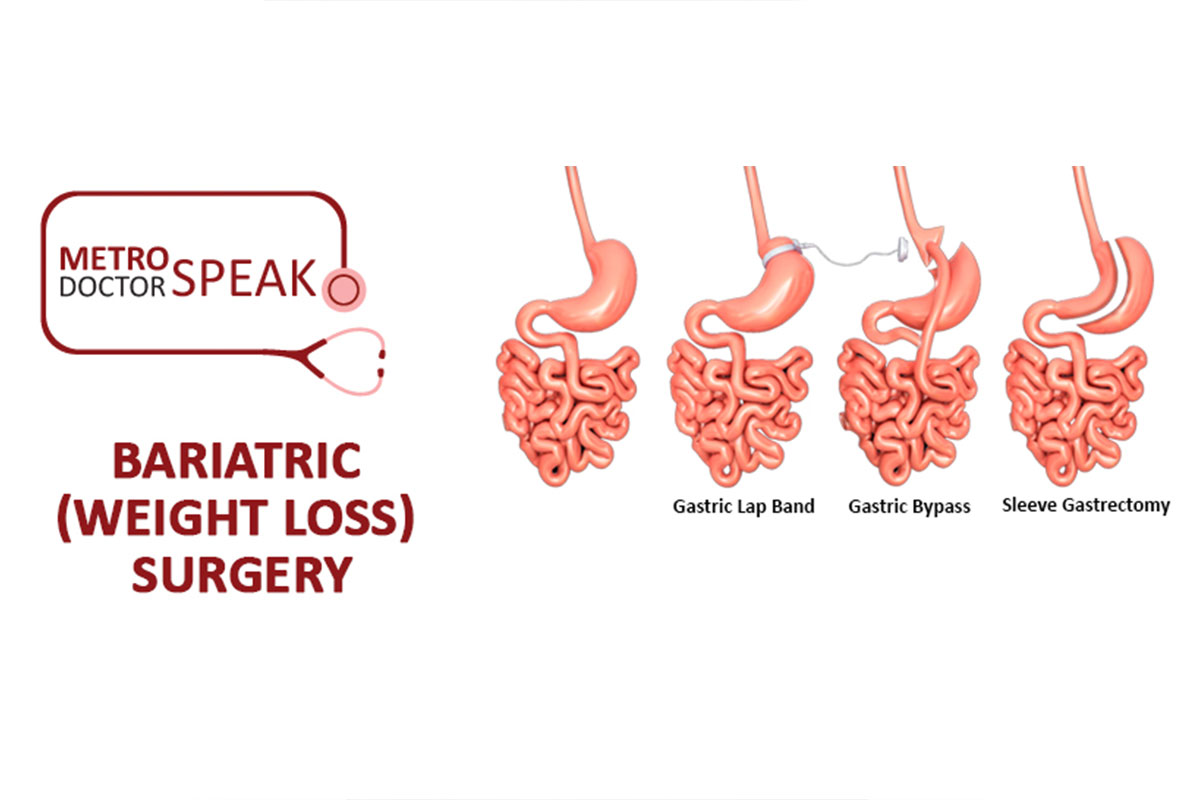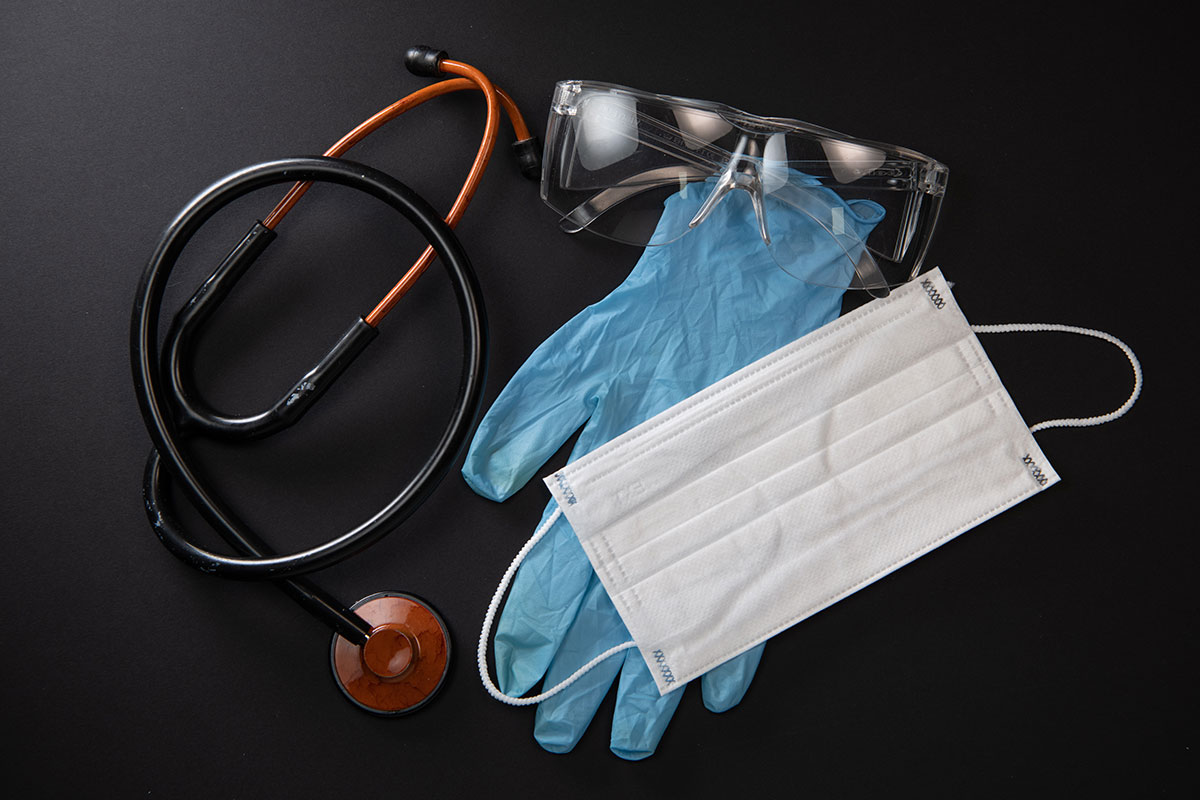
Metro Doctor Speak: Bariatric (Weight Loss) Surgery
By Dr. Jitendra Agrawal in Gastroenterology
May 15, 2020
Interview with: Dr. Jitendra Agrawal, Sr. Consultant – GI & Metabolic Surgery & Dr. Dipankar Sankar Mitra, Consultant – GI & Metabolic Surgery
1. What are the different types and techniques of Bariatric Surgery?
a) Gastric Bypass
Gastric Bypass surgery will help you to lose your excess weight, this surgery will change the way your stomach and small intestine handles the food that you eat.
The surgery includes 2 steps:
During the 1st step, the surgeon will make your stomach smaller as he will use staples to divide your stomach into two sections- upper section and a larger bottom section, because of which you will eat less and eventually will lose the weight. The upper part of your stomach which is known as pouch stores the food. The size of the pouch is of a walnut. It can store up to 28 grams of food.
The second step of the surgery is known as bypass. During this procedure your surgeon will connect a small part of your small intestine which is known as jejunum to a small hole in the pouch. Now, the food that you eat will travel from the pouch into this new opening and later in your small intestine. As an end result, your body will consume fewer calories.
After this surgery, the size of your stomach will be smaller and you will feel full with less intake of food. After the surgery, your body will not get all the calories from the food that you eat because the food will no longer go into a large some part of your stomach.
b) Sleeve Gastrectomy:
Sleeve Gastrectomy is a surgical weight loss procedure where the part of the stomach is dissected. During the procedure, the size of the stomach is reduced down to 15% of its original size. The reduced size of the stomach will result into a sleeve or tube like structure. The procedure is performed laparoscopically and is irreversible in nature. Sleeve Gastrectomy leads to permanent reduction in the size of the stomach; however there could be some enlargement in the size of the stomach later on in life.
Sleeve Gastrectomy is as effectual as Gastric Bypass surgery, in the process of weight loss.
c) Adjustable Gastric Lap Band:
Adjustable Gastric Band is an inflatable silicon device which is placed around the top portion of the stomach to treat the obesity in a person. Adjustable gastric band is also known as Lap-band, A Band or LAGB. This band will slow down the consumption of food further reducing the amount of calories consumed.
The band is placed around the upper part of the stomach which creates a smaller stomach pouch. The procedure will slowly limit the intake of food which can be consumed at one time, further giving the sense of fullness. A person who has opted for adjustable gastric band can achieve sustained weight loss by opting healthy food habits.
Gastric banding is one of the least invasive surgeries under the section of various weight loss surgeries and is completely reversible, with just another “keyhole” operation. It doesn’t require long stays at hospital, and results in faster recovery, smaller scars and less pain than any open surgery.
d) Endocrine Balloon Procedure:
Endocrine Balloon is a soft biocompatible silicon device which is filled with sterile saline solution and is placed in stomach by a non-surgical procedure in the time frame of 20-30 minutes. With the help of an endoscopic camera the surgeon will insert the deflated balloon through the mouth and esophagus into the stomach. Depending on the characteristics of the person the surgeon might use general or local anesthesia and fill the gastric balloon with the help of fluid supply tube.
This procedure will reduce the hunger, which will help the patient to decrease the amount of calories consumption and eventually results in weight loss.
2. How fast will I lose the weight after the Weight Loss Surgery?
How fast you will lose weight after the surgery will totally depend on the type of surgery you have opted for and how efficiently you are following your physician’s eating and exercising guidelines.
According to doctors, if a patient opts for sleeve gastrectomy or gastric bypass surgery, then they are likely to lose more weight in short time period as compared to lap band surgery. Going over liquid diet or pureed diet will help you to lose more weight in short span of time than going for solid diet.
3. How much weight will I lose after the Weight Loss Surgery?
Your weight loss will be directly proportional to your post surgery diet and exercise regime. You are likely to lose about 5-10 kg of weight in the first few months after the surgery. You will be losing nearly about 60% of your excess weight in the first six months after the surgery and 77% of the excess in the first year. Gradually the rate at which you are losing weight after the surgery will slow down over the period of time.
4. Will I experience any health related problems after the Weight Loss Surgery?
No, you won’t face any health related problems after the Weight Loss Surgery. In fact these kinds of surgeries improve all the weight related medical problems. 90% of the patients who have opted for Gastric bypass surgery have improved their type 2 diabetes, where gastric banding surgery have resolved the same problem in 70% of the patients. The risk of heart disease has been lowered down in almost half of the patients who had opted for Weight Loss Surgery. Nearly 85% of the patients have seen improvement in their sleep disorders.
5. What are eligible criterias to opt for Weight loss Surgery?
Weight Loss Surgery is not advisable to everyone. Doctors generally advise it to those people who have body mass index of 40 or more, which means about 100 pounds overweight for men and 80 for women, people who have lower BMI but have other serious health related problems to obesity such as heart disease, type 2 diabetes, high cholesterol, and those who have tried all the means to lose their weight with dieting, exercising, etc.
6. How much time will it take me to return to my work after bariatric surgery?
You won’t be staying away long from your work after the surgery. In one or two week you will be able to return to work. You might feel low on energy level after the surgery for a while. Your surgeon will provide you with all the information about what sort of work you can do after the surgery till the time you don’t recover completely.
7. If a person has type 2 diabetes will that make the surgery riskier for that person?
Yes, it might be risky for that person. So it’s better to follow all the instructions provided by your surgeon about managing the blood sugar level around the time of the surgery. As seen by the doctors, people living with type 2 diabetes experience big improvement after the surgery.
8. Is it advisable to go for bariatric surgery if someone has heart disease?
Yes, a person can undergo bariatric surgery but the person needs to have the medical clearance from their cardiologist. The post surgery results are very good as they lead to the improvement of various other heart related problems such as high blood pressure, cholesterol, lipid problems, heart enlargement (dilated heart or abnormal thickening), vascular (artery and vein) and coronary (heart artery)disease.
9. I am planning for a baby, so what is the right time to for a baby after the bariatric surgery? Will the baby be healthy?
Doctors recommend waiting for 12-18 months after the surgery. The risk of undergoing problems during the phase of pregnancy (gestational diabetes, eclampsia, macrosomia) and during childbirth is lower after the surgery. The chances of miscarriages and stillbirths also lower down. After the bariatric surgery, the chances of going through C section also reduce.
Yes, the baby will be healthy and fine and will be at lower risk of being affected by obesity later, due to activation of certain genes during fetus growth.
10. Will the doctor put me on special diet prior to my surgery?
Yes, almost every bariatric surgeon puts their patients on a special diet for 2-3 weeks prior to their surgeries. These diets are very much different from the short term diets. This diet helps liver to shrink down while the fat in the abdomen gets reduced, which makes the procedure safe and easy.
11. Do I have to be on diet after my surgery?
Majority of people thinks that dieting is a plan which leaves them hungry but actually going on diet is all about picking up healthy food over tasty food. A person will get their same appetite back within 6-18 months after the surgery. It’s better to discuss all the diet and eating plans with your surgeon after the surgery so that you can stay healthy always.
For free counseling session with our Weight-Loss Nutritionist and Bariatric Surgeon, kindly call: +919910492867 or e-mail: metro@metrohospitals.com







